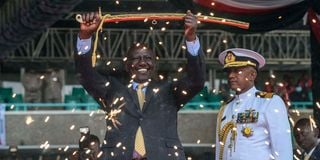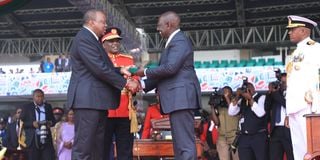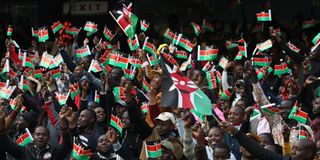Premium
President William Ruto: Here are my pledges to you as I take over

President William Ruto lifts a sword at the Moi International Sports Center Kasarani in Nairobi, Kenya, on September 13, 2022 during the inauguration ceremony.
President William Ruto moved swiftly to capitalise on the momentum of his victory by honouring election pledges on appointment of six judges blocked by his predecessor, assigning an independent budget for police and provision of cheap fertiliser.
In a speech following his swearing-in as the country’s fifth President yesterday, he also promised immediate public participation to decide the fate of the Competency-Based Curriculum (CBC) and committed to implement the Hustler Fund, a key plank of his campaign that won him the support of small scale traders.
The Head of State, in his inaugural address, set the tone for the policies his administration would pursue to forge a “Kenya for everyone”, which he declared would be a break from the past abuse of the public service for partisan political pursuits.

President William Ruto being handed the instruments of power by former President Uhuru Kenyatta after he took the oath of office on September 13, 2022.
Acknowledging his tenancy of State House was only guaranteed because the Independent Electoral and Boundaries Commission (IEBC), security services and the Supreme Court resisted pressure to overturn his victory, President Ruto pledged his government would respect and empower the institutions.
Security services
“The performance of our security services, the IEBC and the Judiciary was put to severe test. By and large, these institutions lived up to our expectations. We can only aspire to do better in future, and I give my undertaking that my administration shall work to ensure that the bar is raised even higher for the next election,” said the President.
President Ruto hit the ground running moments after his inauguration at a colourful ceremony graced by 20 heads of state at the Kasarani stadium in Nairobi, making 10 key pledges that will shape his government s.
Aside from appointing the six judges, President Ruto said his administration would scale up the budgetary allocation to the Judiciary by an additional Sh3 billion annually for the next five years.
“These resources will support the bottom-up scaling of justice by increasing the number of small claims courts from the current 25 to 100. We will also work with the Judiciary to build high courts in the remaining seven counties, magistrates courts in the remaining 123 sub-counties and support their ongoing digitisation programme,” he said.
These interventions, the President noted, will empower the Judiciary to adjudicate and expeditiously conclude corruption cases, commercial disputes and all other matters, thereby enhancing access to justice.

Kenyans at Kasarani Stadium ahead of inauguration of Dr William Ruto as the 5th President.
While acknowledging the efforts by his opponent – Azimio la Umoja One Kenya presidential candidate Raila Odinga and his running mate Martha Karua, the Head of State announced that retired President Kenyatta will continue chairing the region’s peace initiatives.
“On peace initiative in our region, in Ethiopia and the Great Lakes region, I have asked my elder brother President Uhuru Kenyatta, who has had commendable engagement with the region and he has graciously agreed to continue chairing those discussions on behalf of the government of Kenya,” he announced.
He did not, however, fail to criticise his predecessor over the high cost of living that characterised his administration, in which he served as Deputy President. He lamented that the interventions that had been put in place to reduce the high cost of living had not borne fruit.
“On fuel subsidy alone, the taxpayers have spent a total of Sh144 billion, a whopping Sh60 billion in the last four months. If the subsidy continues to the end of the financial year, it will cost the taxpayer Sh280 billion, equivalent to the entire national government’s development budget.
“Additionally, there was an attempt to subsidise unga (maize flour) in the run-up to the election, a programme that gobbled up Sh7 billion in one month, with no impact,” the President charged.
He pointed out that in addition to being very costly, consumption subsidies were prone to abuse, distort markets and create uncertainty, including artificial shortages.
“The cost of living challenges are related to production. Our strategy to bring down the cost of living is predicated on empowering producers. The forecast for maize harvest this year is below 30 million bags against the normal production of 40 million bags. The main cause of the decline in production is the high cost of inputs.
“Our priority intervention therefore, is to make fertiliser, good-quality seeds and other agricultural inputs affordable and available,” said President Ruto.
For the short rains season, he announced, his government has already made arrangements to make 1.4 million bags of fertiliser available at Sh3,500 for a 50kg bag, down from the current Sh6,500, to be available from next week.
“I appeal to county governments in Eastern, Central and Western regions to work with us in making sure that the fertiliser is available to farmers,” he said.
The President also had good news for tea farmers, outlining an initial intervention to supply fertilisers to them at a subsidised price even as he promised medium and long term solution.
“To cushion tea farmers, we have made arrangements with KTDA (Kenya Tea Development Authority) to immediately supply tea farmers with fertiliser at Sh3,500,” he said.
The Head of State also promised a raft of changes in IEBC and the National Police Service to enhance efficiency.
“As required by Article 245 of the constitution, the Inspector-General of Police is mandated to exercise independent command over the National Police Service. The services’ operational autonomy, however, has been undermined by the continued financial dependence on the Office of the President. This situation is going to change,” said the President.
He said he had already instructed that the instrument conferring financial autonomy to the National Police Service by transferring its budget from the Office of the President and designating the Inspector-General as the accounting officer, be placed on his desk for signing.
Financial independence to the police, he noted, will give impetus to the fight against corruption and end the weaponisation of the criminal justice system.
He assured all public officers that his administration will respect them as professionals, and no public servant, even chiefs and their assistants, will be required to run political errands for any political party or formation.
In the run-up to the General Election, Dr Ruto alleged that some senior government officials were working in cahoots with chiefs and other government administrators, with full knowledge of President Kenyatta, to campaign for his opponents.
In fulfilling his campaign promise to the coastal city of Mombasa, President Ruto ordered all cargo clearance be reverted to the port.
Transfer of port services from Mombasa to the Nairobi and Naivasha Inland Container Depots (ICD)s was a hot topic in the presidential campaigns in Mombasa and Nakuru counties.
Leaders from Mombasa have been demanding the return of port operations to the coastal city, while their Nakuru counterparts pushed for more investment in the Naivasha ICD.
“This afternoon, I will be issuing instructions for clearing of all goods and other attendant operational issues to revert to the port of Mombasa. This will restore thousands of jobs in the city of Mombasa,” the President announced yesterday.
He further promised to implement the Hustler Fund, dedicated to the capitalisation of micro, small and medium-sized enterprises through chamas, saccos and cooperatives to make credit available on affordable terms that do not require collateral.
“To implement all these interventions, we shall establish a Ministry of Cooperatives and SME Development mandated to ensure that every small business has secure property rights, access to finance and a supportive regulatory framework.”
The Head of State vowed to deal with youth unemployment by rolling out an affordable low-cost housing programme, targeting an average of 250,000 units a year.
“This will create opportunities in the entire job market. We will engage TVET institutions to provide necessary skills to enable the Jua Kali industry to supply standardised products for our housing programme. We will leverage on our competitive advantage in leather and textile to roll out our a labour intensive agro-processing industrialisation programme. This will start with the Dongo Kundu and Naivasha industrial parks,” he said.
On the health front, the President said contribution to the National Health Insurance Fund will be graduated based on the income of contributors.
On CBC, President Ruto promised to establish an reform task force, to be launched soon, to collect views from all key players that will inform its review.
“We are particularly alive to the anxieties of parents on the twin transitions of the last 8-4-4 class and the first CBC class in January next year. I assure them that there will be a solution to the matter before then,” he said.
Dr Ruto also announced the elevation of diaspora matters.
“The complaint has been that the diaspora has not received the attention they deserve. The focus has been on remittances, while their fundamental rights as citizens have been neglected. To correct this oversight, I pledge to elevate diaspora issues at a ministry level and strengthen diaspora services in all embassies.”
He also promised to work with Parliament to set up a committee that will exclusively deal with diaspora issues, set up mechanisms for public participation by the diaspora and work closely with the IEBC to expand diaspora participation in polls.





